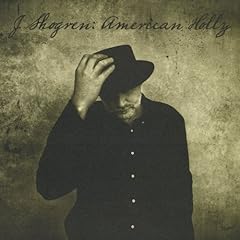|
J Shogren, American Holly (JAHA!, 2008) Split the difference between Leonard Cohen and Bob Dylan, and while you won't have everything you need to know about J Shogren (no period after the initial, I gather), you will have at least a place to start. Shogren -- who even bears a vague physical resemblance to him -- has Cohen's mordant wit. Cohen could have written lines such as "Every man's Aristotle when he's drunk" and "I'll be a hand grenade for Jesus." Shogren, too, has a foot in the soil of traditional American music, sharing ground with Dylan. Like Dylan, he writes his own songs even as he nods to or winks at others. Here it's old songs like "John Henry," "Keep the Skillet Good & Greasy" and -- wonderfully -- "My Name is John Johnson."
Though endearingly odd, it is also not a little disorienting. A part of that owes to the distinctive production, bringing to psychic eye and ear the sepia tones, in the first instance, of 19th-century American-village photography and, in the second, of the small-town folk orchestras so often captured in those pictures. Or this could be a lost America in a parallel universe. If Shogren and his band summon up ghosts, they are not necessarily of persons once extant in the earthly flesh. The powerful opening cut, also the title song, is set in a war-ravaged landscape that one at first presumes to be a Civil War battlefield but whose geography and circumstance become ever less fixed, notwithstanding the singer's repeated, insistent reference to "American Holly." A woman? Something else? A warning to those seeking easy pleasures: In some ways Shogren's recording is a demanding one, not always suited to casual listening. At 17 cuts this is, in my estimation anyway, three or four too long. Still, even the occasional slow patch rewards the patient pilgrim, and it helps if you keep in mind that Shogren is far more the professor than the trapper. His vision of a frontier world is a metaphysical, not a physical, one, where the familiar always manages to stay just out of focus. Shogren takes a host of recognizable images and influences and turns them deeply strange.  |
 Rambles.NET review by Jerome Clark 6 June 2009 Agree? Disagree? Send us your opinions! 





|

